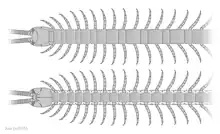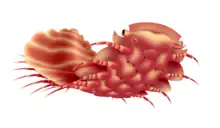| Panther Mountain Formation | |
|---|---|
| Stratigraphic range: | |
| Type | Formation |
| Unit of | Hamilton Group |
| Underlies | Portland Point Formation, Plattekill Formation |
| Overlies | Cherry Valley Limestone |
| Lithology | |
| Primary | Shale |
| Location | |
| Region | |
| Country | |
| Type section | |
| Named for | Panther Mountain |
The Panther Mountain Formation is a geologic formation in New York. It preserves fossils dating back to the Devonian period. It is located in the counties of Albany, Madison, Oneida, Otsego, and Schoharie. It is well known for its fossil arthropods preserved as flattened cuticles, including Attercopus and Dracochela.[1]
Paleobiota
Arachnids
| Arachnids | |||
|---|---|---|---|
| Genus | Species | Notes | Images |
| Aculeatarbus | A. depressus | A trigonotarbid in the family Palaeocharinidae.[2] | |
| Alkenia | A. mirabilis | A trigonotarbid in the family Aphantomartidae.[2] | |
| Archaeacarus | A. dubinini | A mite in the family Alicorhagiidae.[3] | |
| Archaeomartus | A. levis | A trigonotarbid in the family Archaeomartidae. A. tuberculatus is a synonym of A. levis.[2] | |
| Attercopus | A. fimbriunguis | A member of order Uraraneida. Originally described as a species of Gelasinotarbus.[2][4][5] |  |
| Devonacarus | D. sellnicki | A oribatid mite.[6] | |
| Dracochela | D. deprehendor | A pseudoscorpion.[7][8] | |
| Ecchosis | E. pulchribothrium | An indeterminate pulmonate (arthropod with book lung), possibly whip spider.[9] | |
| Gelasinotarbus | G. bonamoae, G. bifidus, G. heptops, G. reticulatus | Trigonotarbids in the family Palaeocharinidae.[2] | |
| Gilboarachne | G. griersoni | ||
| Palaeocharinus | P. sp. |  | |
| Protochthonius | P. gilboa | A oribatid mite.[6] | |
Myriapods
| Myriapods | |||
|---|---|---|---|
| Genus | Species | Notes | Images |
| Crussolum | C. crusserratum | A scutigeromorph centipede.[10] |  |
| Devonobius | D. delta | A centipede in the order Devonobiomorpha.[11] |  |
| Microdecemplex | M. rolfei | A millipede in the order Microdecemplicida, in the subclass Arthropleuridea.[12] |  |
Insects
Eye fragments of supposed archaeognathan affinities, and scales of possible archaeognathan or zygentoman affinities are known.[13]
Flora
| Flora | |||
|---|---|---|---|
| Genus | Species | Notes | Images |
| Haskinsia | H. colophylla | Lycopod.[2] | |
| Lecleruqia | L. complexa | ||
| Rellimia | R. thomsonii | a progymnosperm.[2] | |
See also
- Gilboa Fossil Forest, forest existed in Givetian of New York
- List of fossiliferous stratigraphic units in New York
References
- ↑ "The Panther Mountain Formation". Binghamton University. August 31, 2009. Retrieved November 5, 2020.
- 1 2 3 4 5 6 7 Bonamo, P. M.; Grierson, James D.; Rolfe, W. D. Ian; Selden, Paul; Shear, William A. (1987). American Museum of Natural History Library. "New terrestrial arachnids from the Devonian of Gilboa, New York (Arachnida, Trigonotarbida)". American Museum Novitates (2901) – via Biodiversity Heritage Library.
- ↑ Kethley, John B.; Norton, Roy A.; Bonamo, Patricia M.; Shear, William A. (1989). "A Terrestrial Alicorhagiid Mite (Acari: Acariformes) from the Devonian of New York". Micropaleontology. 35 (4): 367–373. doi:10.2307/1485678. ISSN 0026-2803.
- ↑ Paul A. Selden, William A. Shear & Patricia M. Bonamo (1991). "A spider and other arachnids from the Devonian of New York, and reinterpretations of Devonian Araneae". Palaeontology. 34: 241–281. hdl:1808/8336.
- ↑ P. A. Selden, W. A. Shear & M. D. Sutton (2008). "Fossil evidence for the origin of spider spinnerets, and a proposed arachnid order". Proceedings of the National Academy of Sciences. 105 (52): 20781–20785. doi:10.1073/pnas.0809174106. PMC 2634869. PMID 19104044.
- 1 2 Norton, Roy A.; Bonamo, Patricia M.; Grierson, James D.; Shear, William A. (1988). "Oribatid Mite Fossils from a Terrestrial Devonian Deposit near Gilboa, New York". Journal of Paleontology. 62 (2): 259–269. Bibcode:1988JPal...62..259N. doi:10.1017/S0022336000029905. ISSN 0022-3360. JSTOR 1305232. S2CID 133114808.
- ↑ Bonamo, P. M.; Schawaller, Wolfgang; Shear, William A. "The first Paleozoic pseudoscorpions (Arachnida, Pseudoscorpionida). American Museum novitates ; no. 3009". Biodiversity Heritage Library. Retrieved October 2, 2023.
- ↑ Judson, Mark L. I. (2012). "Reinterpretation of Dracochela deprehendor (Arachnida: Pseudoscorpiones) as a stem-group pseudoscorpion: STEM-GROUP PSEUDOSCORPION". Palaeontology. 55 (2): 261–283. doi:10.1111/j.1475-4983.2012.01134.x.
- ↑ Selden, Paul A.; Shear, William A.; Bonamo, Patricia M. (1991). "A spider and other arachnids from the Devonian of New York, and reinterpretations of Devonian Araneae".
{{cite journal}}: Cite journal requires|journal=(help) - ↑ Shear, William A.; Jeram, Andrew J.; Selden, Paul (1998). "Centiped legs (Arthropoda, Chilopoda, Scutigeromorpha) from the Silurian and Devonian of Britain and the Devonian of North America. American Museum novitates ; no. 3231". hdl:2246/3370.
{{cite journal}}: Cite journal requires|journal=(help) - ↑ Bonamo, P. M.; Shear, William A. (1988). "Devonobiomorpha, a new order of centipeds (Chilopoda) from the Middle Devonian of Gilboa, New York State, USA, and the phylogeny of centiped orders. American Museum novitates ; no. 2927". Biodiversity Heritage Library. American Museum of Natural History Library.
- ↑ Wilson, Heather M.; Shear, William A. (1999). "Microdecemplicida, a new order of minute arthropleurideans (Arthropoda: Myriapoda) from the Devonian of New York State, U.S.A." Earth and Environmental Science Transactions of the Royal Society of Edinburgh. 90 (4): 351–375. doi:10.1017/S0263593300002674. ISSN 1473-7116. S2CID 129597005.
- ↑ Haug, Carolin; Haug, Joachim T. (May 30, 2017). "The presumed oldest flying insect: more likely a myriapod?". PeerJ. 5: e3402. doi:10.7717/peerj.3402. ISSN 2167-8359. PMC 5452959.
This article is issued from Wikipedia. The text is licensed under Creative Commons - Attribution - Sharealike. Additional terms may apply for the media files.